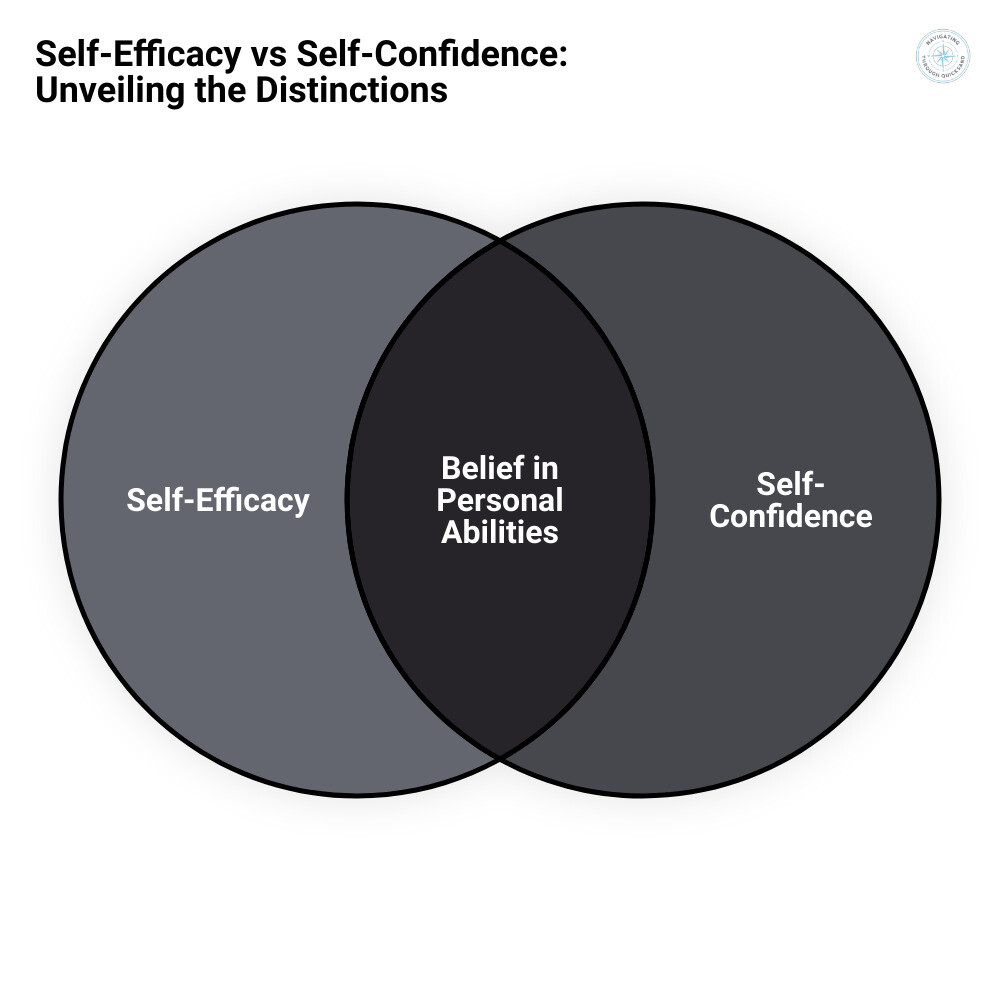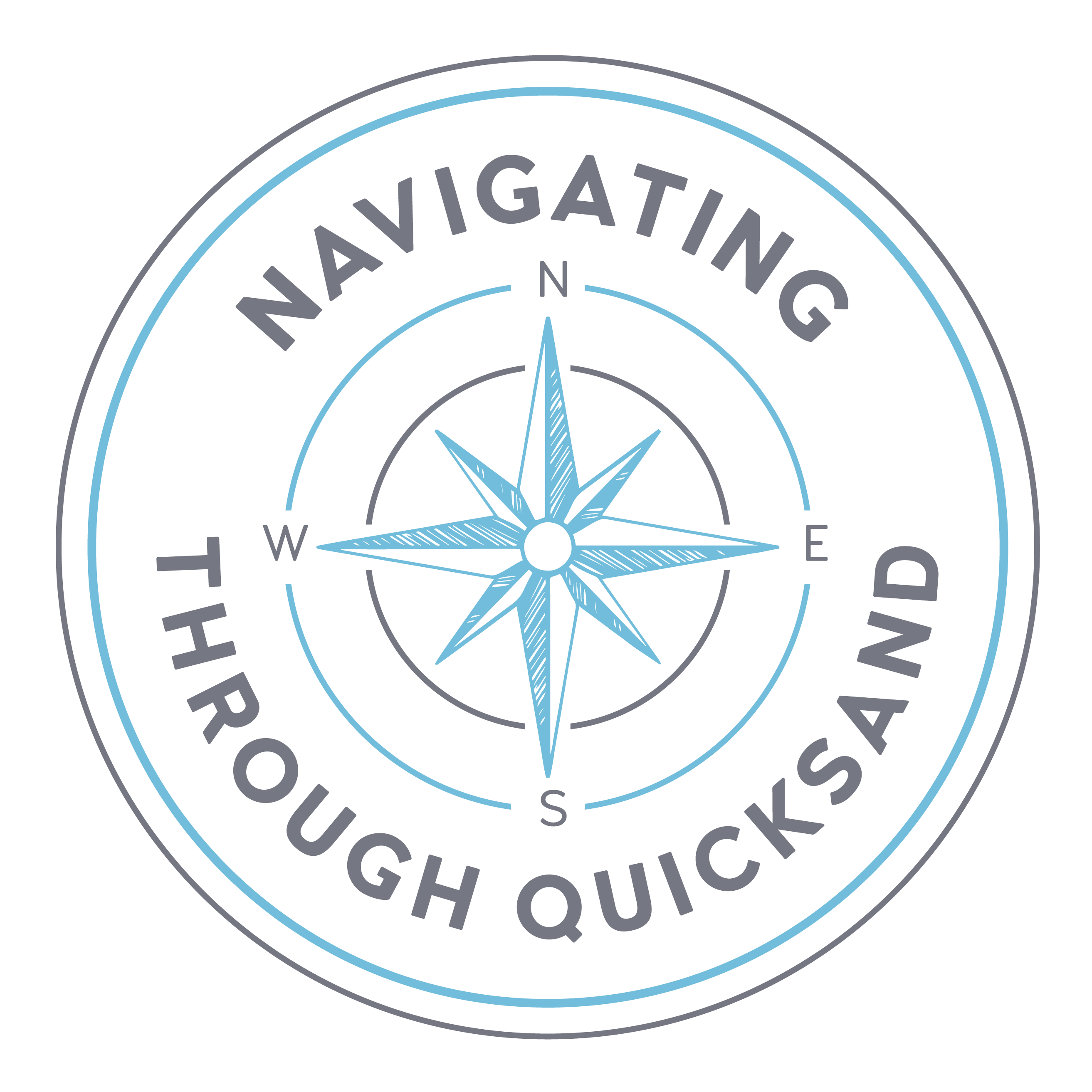When it comes to understanding self-efficacy vs self-confidence, it’s vital to grasp that although they might seem similar, they serve different roles in our lives. Self-efficacy refers to our belief in our ability to succeed in specific situations or accomplish a task.
It’s about knowing you can handle new challenges, learn from them, and adapt. On the other hand, self-confidence is more about our overall trust in ourselves and our abilities across a broad spectrum. It’s the feeling that if we put our mind to something, we can achieve it.
If you’re a busy professional in New England feeling stuck and looking for a quick distinction:
- Self-Efficacy: Your belief in your capacity to execute behaviors necessary to produce specific performance attainments (reflects confidence in the ability to exert control over one’s own motivation, behavior, and social environment).
- Self-Confidence: A general sense of trust in your own ability to control your life, tasks, and challenges.
Understanding these differences is key to transforming challenges into stepping stones for success. Whether facing a new job role or navigating personal hardships, grasping the essence of these concepts can empower you to make informed decisions about your next steps.
Overcoming these challenges and achieving success in self-efficacy and self-confidence is just a matter of effort and mindset.

Table of Contents
Defining the Concepts: Self-Efficacy and Self-Confidence
When we talk about our ability to face life’s hurdles, two terms often come up: self-efficacy and self-confidence. Though they might sound similar, they have distinct meanings that can significantly impact how we approach challenges. Let’s dive into what each of these terms means and how they influence our personal growth and belief in ourselves.
At the core of both concepts are self beliefs, which form the foundation of self-efficacy and self-confidence, shaping our expectations and attitudes towards achieving personal goals and overcoming obstacles. Low self-efficacy can lead to avoidance, anxiety, and giving up easily, contrasting sharply with the broader concept of self-confidence.
Self-Efficacy Explained
Imagine you’re standing in front of a huge wall that you need to climb over. Self-efficacy is your belief in your ability to find a way up and over that wall. It’s not about how strong you are or how many walls you’ve climbed before; it’s about your confidence in your capability to figure it out this time around.
The concept of self-efficacy was introduced by Albert Bandura, a psychologist who played a crucial role in developing the social cognitive theory.
According to Bandura, self-efficacy is based on four sources: our own experiences of success, our observations of others’ successes, the encouragement we receive from people around us, and our physical and emotional states. This belief is specific to situations and tasks, meaning you might feel highly efficacious in solving math problems but less so in social situations. Importantly, discrepancies between self-efficacy beliefs and actual performance can influence one’s motivation and goal setting, as individuals might set higher goals for themselves when they believe in their capabilities, even if past performances suggest otherwise.
Achievement motivation significantly impacts self-efficacy, as it encompasses the drive to pursue and attain goals, enhancing one’s belief in their performance capability and motivational behavior across various domains. This process of achievement motivation is crucial in understanding how self-efficacy functions not just as a state of confidence for current tasks but also as a dynamic component of the learning process, fostering the belief in one’s ability to learn, persist, and succeed in the face of new challenges.
Self-Confidence Unveiled
Now, let’s say you’re standing in front of the same wall. Self-confidence is a broader term. It’s your overall belief in yourself and a general trust in your ability to deal with life’s challenges, including climbing that wall. Self-confidence doesn’t concern itself with specific tasks or situations. Instead, it’s an overall sense of trust in your capabilities and worth as a person.
Unlike self-efficacy, which is built through specific experiences and observations, self-confidence grows from a broader range of experiences, including social interactions, achievements, and even the way we talk to ourselves. It’s the feeling of inner strength that says, “I can handle what comes my way,” without necessarily knowing how.
In summary, while self-efficacy is about believing in your ability to succeed in specific tasks or situations, self-confidence is a more general belief in your overall capabilities. Understanding these differences can empower you to approach life with a clearer sense of purpose and capability, whether you’re facing a literal or metaphorical wall.
By recognizing the unique roles that self-efficacy and self-confidence play in our lives, we can better navigate through quicksand moments, turning adversities into strengths. It’s not just about believing in ourselves but understanding where that belief stems from and how it applies to different aspects of our lives. Building self-confidence can be a crucial step in improving low self-esteem, as it enhances our overall trust in our abilities and worth as a person, despite the challenges we may face.
Key Differences Between Self-Efficacy vs Self-Confidence

Impact on Goal Pursuit
When we think about reaching our goals, the difference between self-efficacy and self-confidence really matters.
- Self-efficacy is like having a map for a specific journey. It means believing you can cross a river because you know how to build a bridge. It’s specific and focused. If you’re good at math, you believe you can solve a math problem. This belief in your specific abilities can push you toward specific achievements and goals. It’s about knowing how to reach a destination. Confidence judgments play a crucial role here, as they affect our motivation and persistence by influencing our choice of activity, effort expenditure, and emotional reactions towards achieving our goals.
- Self-confidence, on the other hand, is like believing you’re a good traveler in general. You feel you can navigate any journey, even if you don’t have the map yet. This broad belief can motivate you to try new things, but it’s not as targeted as self-efficacy. It’s about believing you can find a way to reach a destination, even if you’re not sure how yet.
Influence on Personal Development
The journey of personal growth is also influenced differently by these concepts.
- Self-efficacy grows from specific experiences and learning. For example, if you practice public speaking and get better over time, your belief in your ability to speak publicly improves. This is observational learning—seeing what works and what doesn’t, and adjusting accordingly. It’s about building skills in particular areas of your life, which can also boost your overall confidence.
- Self-confidence is more about your overall view of yourself. It’s nurtured by successes but also by positive feedback, encouragement, and a general sense of self-worth. It’s less about what you can do and more about believing in your value as a person. This can make you more willing to try new things, take risks, and bounce back from failure, because your belief in yourself is not tied to any specific outcome.
Both self-efficacy and self-confidence are crucial for navigating life’s challenges. Understanding their differences helps us see that:
- Self-efficacy drives us towards specific goals and achievements, growing with each success and failure in those areas.
- Self-confidence gives us the courage to pursue new experiences, bolstered by a general belief in our own worth.
Incorporating self-evaluation into this process enhances personal development by allowing individuals to reflect on their thoughts and actions, thereby regulating them to achieve desired outcomes. This cognitive process is essential for understanding the role of confidence expectations, self-efficacy, self-concept, and anxiety in predicting individual achievement, such as in mathematics. Through self-evaluation, one can assess their progress, identify areas for improvement, and adjust strategies to enhance both self-efficacy and self-confidence. This balance is key to navigating through quicksand moments in life, turning adversities into strengths with both a clear sense of purpose and a resilient belief in ourselves.
Building Blocks of High Self-Efficacy

Mastery Experiences
Think of mastery experiences as your personal success stories. When you set a challenging goal and achieve it, this boosts your belief in your abilities. It’s like winning a tough game or solving a hard puzzle. Success breeds confidence in your skills. But remember, the road to mastery isn’t just about the wins; it’s also about how you deal with setbacks. Overcoming challenges teaches you resilience and strengthens your belief in your ability to succeed next time.
Social Modeling
Ever watched someone you relate to succeed and thought, “If they can do it, so can I”? That’s social modeling in action. Seeing peers or role models achieve goals, especially those who share similarities with you, can boost your confidence in your abilities. It’s not just about copying what they do; it’s about learning that success is possible and within reach. This is why stories of people overcoming obstacles can be so powerful—they show us that success is attainable.
Social Persuasion
Getting a “You can do it!” from someone you respect can be a game-changer. Positive feedback and verbal encouragement from friends, mentors, or coaches can significantly lift your spirits and belief in your capabilities. It’s like having a personal cheerleader. However, it’s crucial to seek encouragement from those who are supportive and avoid negativity, as positive reinforcement is key to building self-efficacy.
Psychological Responses
Your emotions and stress levels play a big role in how confident you feel about tackling tasks. Learning stress management techniques and how to regulate your emotions can help you maintain a calm, confident mindset even in challenging situations. It’s not about suppressing what you feel but understanding and managing your reactions to maintain self-belief. For example, deep breathing or positive self-talk can help turn nervous energy into focused enthusiasm.
By focusing on these building blocks, you can develop a stronger sense of self-efficacy, empowering you to face life’s challenges with confidence. It’s a combination of personal achievements, learning from those around you, positive reinforcement from your community, and managing your psychological responses that builds a robust belief in your capabilities.
Enhancing Self-Confidence for Healthy Self-Esteem

Enhancing self-confidence is like watering a plant. It needs consistent care, the right environment, and a bit of sunshine to thrive. Let’s explore how you can nurture your self-confidence garden.
Reflecting on instances of poor performance in past experiences can serve as a valuable learning opportunity. By understanding and analyzing what led to these outcomes, individuals can identify areas for improvement and develop strategies to overcome similar challenges in the future. This process not only aids in enhancing self-confidence but also fosters a growth mindset, encouraging the belief that abilities and intelligence can be developed with effort, learning, and persistence.
Celebrate Your Success
Acknowledge every win. No matter how small, each success is a stepping stone to believing in yourself. Did you finish a task you’ve been putting off? Celebrate it! This is about reinforcing the idea that you are capable and competent.
Positive self-talk is your cheerleader. Instead of being your own critic, be your cheerleader. Swap “I can’t” with “I can” and “I failed” with “I learned”. This shift in language transforms your mindset and fuels your self-belief.
Observe Others
Role models are mirrors. Seeing someone you relate to achieving goals or overcoming obstacles is powerful. It’s like looking into a mirror and seeing what’s possible for you. Find role models who reflect where you want to be and let their journeys inspire you.
Similarity breeds belief. When we see people similar to us succeed, it’s easier to believe that we can achieve the same. Seek out stories of individuals who share your background, challenges, or aspirations. Their victories pave a path for your own.
Seek Positive Affirmations
- Encouragement is key. Surround yourself with people who believe in you and aren’t afraid to show it. Positive feedback from friends, mentors, or even a supportive online community can boost your confidence.
- Avoid negativity. Constructive criticism is helpful, but constant negativity can erode your self-belief. Be mindful of who you seek feedback from and choose those who want to see you grow.
Pay Attention to Your Thoughts and Emotions
Stress reduction is a superpower. High stress can cloud your judgment and dampen your confidence. Find stress-reducing activities that work for you, be it meditation, exercise, or a hobby, and make them a regular part of your life.
Cultivate a positive mindset. Your thoughts have a profound impact on your feelings and actions. Practice focusing on the positive aspects of your life and tasks. When you catch yourself dwelling on negativity, consciously shift your focus to what’s going well.
In enhancing self-confidence, it’s about the journey, not just the destination. Every step you take towards acknowledging your successes, learning from others, seeking positive affirmations, and managing your thoughts and emotions plants seeds of self-belief. With time and care, these seeds will grow into a garden of confidence that empowers you to face challenges head-on. As you navigate through life’s quicksand, your self-confidence is your solid ground.
Navigating Through Quicksand, LLC

At Navigating Through Quicksand, LLC, we understand life throws us into situations where we feel stuck, unsure, and overwhelmed. Much like actual quicksand, the more we panic and rush, the deeper we sink. However, it’s in these moments, through the right mindset and actions, that we can turn our adversities into strengths.
Self-doubt often acts as a barrier to personal growth, influencing our self-efficacy, self-concept, and even heightening anxiety. It’s a common challenge across different countries, affecting performance in areas like mathematics and other cognitive tasks. However, recognizing self-doubt as a prevalent issue allows us to address it directly, implementing strategies to overcome these feelings and bolster confidence judgments. By understanding self-doubt’s impact and working through it, we empower ourselves to achieve greater success and fulfillment.
Empowering Individuals
We believe in empowering individuals by equipping them with the tools and mindset to navigate through life’s challenges. It’s not just about pulling yourself out of a tough spot; it’s about transforming that experience into a stepping stone towards personal growth and success.
- Learning as You Go: Like an entrepreneur with high self-efficacy, we encourage you to adopt the mentality of “figuring things out.” It’s okay not to have all the answers right now. What’s important is your belief in your ability to learn, adapt, and find solutions.
- Collaborative Partnerships: Understanding that you’re not alone is crucial. Sometimes, the push you need comes from collaborative partnerships. Sharing knowledge, skills, and experiences can illuminate paths you might not have seen on your own.
Turning Adversities into Strengths
Adversities are a part of life, but they don’t define us. Instead, they offer unique opportunities for growth and learning.
- Embrace the Process: Every challenge is a lesson in disguise. By embracing the process of moving from incompetence to competence, you build a resilient mindset that thrives on challenges rather than fearing them.
- Celebrate Small Victories: Every step forward, no matter how small, is progress. Celebrating these victories reinforces self-belief and confidence, key components in the journey of personal development.
- Positive Self-Talk: Transforming adversities into strengths begins with the dialogue we have with ourselves. Positive self-talk, inspired by our own experiences and those of others, fuels our journey towards self-efficacy and confidence.
At Navigating Through Quicksand, LLC, we’re more than just a company; we’re a community committed to inspiring change and igniting passion. By focusing on empowering individuals and turning adversities into strengths, we help people navigate the quicksand of life, not just to survive but to thrive.
As you continue to navigate through life’s challenges, your journey of self-discovery and growth is supported by a belief in your abilities and the strength you gain from every adversity faced. Navigating Through Quicksand, LLC is here to remind you that with the right mindset and support, you can turn any situation into a stepping stone for success.
Conclusion
In wrapping up our exploration of self-efficacy vs self-confidence, recognize that both play crucial roles in how we navigate life’s challenges. While self-efficacy focuses on our belief in our ability to handle specific tasks or situations, self-confidence is more about our overall belief in ourselves. Understanding the difference between the two can empower us to approach obstacles with a more targeted mindset.
When facing a new challenge, ask yourself: Is this a matter of needing to believe in my general abilities more (self-confidence) or is it about trusting in my capacity to handle this specific situation (self-efficacy)? This distinction can guide you in choosing the right strategies to bolster your belief in yourself.
Life is full of ups and downs, much like navigating through quicksand. Sometimes, we might feel stuck or unsure of our next step. However, just as we’ve discussed the importance of self-efficacy and self-confidence, it’s equally important to remember that we have the power to move forward. Every challenge we face is an opportunity to grow our self-efficacy and self-confidence, little by little.
Contact us today at Navigating Through Quicksand, LLC, we understand the complexity of these concepts and the impact they have on your ability to overcome life’s hurdles. We’re dedicated to empowering individuals by turning adversities into strengths. Through our services, we offer support and guidance to help you build both your self-efficacy and self-confidence, so you can not just survive, but thrive.
Our Content
Our content is carefully created and edited by Ashley Gustafson to ensure that the content is accurate, reliable, and up-to-date. Navigating Through Quicksand, LLC is a trusted inspirational woman, inspirational speaker, and personal development coach in Massachusetts for confidence coaching programs for women such as leadership workshops, communication workshops, low self-confidence programs, fitness workshops, and more. Navigating Through Quicksand, LLC has empowered individuals with over 15 years of experience working with students and athletic teams from local communities.



